SUSANN COKAL in The New York Times:
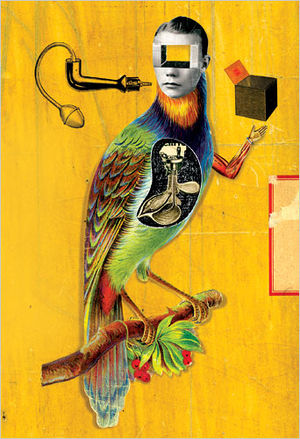 The box, the simple box, may be the art form of the 21st century. With or without its sixth wall, it promises a mystery; when its contents (or lack thereof) are displayed, some deeper mystery often remains. Past masters like Joseph Cornell and Marcel Duchamp have inspired new generations of artists to fill rectangular solids with an assortment of found objects. Depending on your taste and perspective, this is either a form of sculpture or a short step up from the elementary-school diorama. The box is thus the darling of both the Tate Modern and the community amateur show: the bricolage celebrates vision rather than craft, suggesting to some that art is effortless, to others that it’s inscrutable. Meaning seems either elusive or all too obvious.
The box, the simple box, may be the art form of the 21st century. With or without its sixth wall, it promises a mystery; when its contents (or lack thereof) are displayed, some deeper mystery often remains. Past masters like Joseph Cornell and Marcel Duchamp have inspired new generations of artists to fill rectangular solids with an assortment of found objects. Depending on your taste and perspective, this is either a form of sculpture or a short step up from the elementary-school diorama. The box is thus the darling of both the Tate Modern and the community amateur show: the bricolage celebrates vision rather than craft, suggesting to some that art is effortless, to others that it’s inscrutable. Meaning seems either elusive or all too obvious.
Gabriel Collins, the narrator of Stacey D’Erasmo’s new novel, “The Sky Below,” imagines his life as a series of such containers. He begins with the boxes and wrapping paper from which his mother builds elaborate mini-cities during his New England childhood; graduates in adolescence to shoeboxes full of pilfered knickknacks, “the kinds of things that would never be missed, that were treasure only to me”; and later embarks on a career as an artist. The objects he thinks of pasting into his works are varied and often grotesque: shreds of balloons, a belt buckle, teeth, hair, watch gears, a bottle of his own mucus, “pop-up line drawings” of male organs and sketches of 9/11.
More here.
Naomi Klein in The Guardian:
 It's time. Long past time. The best strategy to end the increasingly bloody occupation is for Israel to become the target of the kind of global movement that put an end to apartheid in South Africa. In July 2005 a huge coalition of Palestinian groups laid out plans to do just that. They called on “people of conscience all over the world to impose broad boycotts and implement divestment initiatives against Israel similar to those applied to South Africa in the apartheid era”. The campaign Boycott, Divestment and Sanctions was born.
It's time. Long past time. The best strategy to end the increasingly bloody occupation is for Israel to become the target of the kind of global movement that put an end to apartheid in South Africa. In July 2005 a huge coalition of Palestinian groups laid out plans to do just that. They called on “people of conscience all over the world to impose broad boycotts and implement divestment initiatives against Israel similar to those applied to South Africa in the apartheid era”. The campaign Boycott, Divestment and Sanctions was born.
Every day that Israel pounds Gaza brings more converts to the BDS cause – even among Israeli Jews. In the midst of the assault roughly 500 Israelis, dozens of them well-known artists and scholars, sent a letter to foreign ambassadors in Israel. It calls for “the adoption of immediate restrictive measures and sanctions” and draws a clear parallel with the anti-apartheid struggle. “The boycott on South Africa was effective, but Israel is handled with kid gloves … This international backing must stop.”
More here.
Friday, January 9, 2009
Tony Karon in Rootless Cosmopolitan:
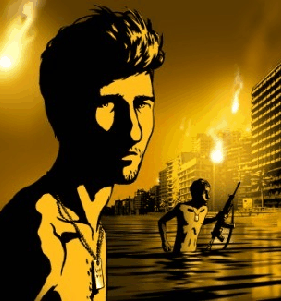 …the U.S. (and the editors of the New York Times and Washington Post) insist that there is a sanity and rationality to sending one of the world’s most powerful armies into a giant refugee camp to rend the flesh and crush the bones of those who stand in its way — whether in defiance or by being unlucky enough to have been born of the wrong tribe and be huddling in the wrong place. By fighting its way to their citadel, they would have us believe, Israel can destroy Hamas and usher in a golden age of peace. Or, to borrow from the casual callousness of Condi Rice during the last such display of futile brutality, we are witnessing, again, the “birth pangs of a new Middle East.” Israel failed in 2006, just as in 2002 and 1982. This time, they tell us, will be different.
…the U.S. (and the editors of the New York Times and Washington Post) insist that there is a sanity and rationality to sending one of the world’s most powerful armies into a giant refugee camp to rend the flesh and crush the bones of those who stand in its way — whether in defiance or by being unlucky enough to have been born of the wrong tribe and be huddling in the wrong place. By fighting its way to their citadel, they would have us believe, Israel can destroy Hamas and usher in a golden age of peace. Or, to borrow from the casual callousness of Condi Rice during the last such display of futile brutality, we are witnessing, again, the “birth pangs of a new Middle East.” Israel failed in 2006, just as in 2002 and 1982. This time, they tell us, will be different.
And then the horror unfolds, as it always does — the hundreds of civilians butchered as they cowered in what they were told were places of safety, mocking Israel’s torrent of self congratulation over its restraint and its brilliant intelligence — and the hopelessly out-gunned enemy manages to survive, as he does every time. And by surviving, grows stronger politically. No matter how many are killed, the leaders targeted by Israel’s military are endlessly regenerated in the fertile soil of grievance and resentment born of the circumstances Israel has created. Circumstances it has created, but which it, and its most fervent backers refuse to acknowledge, much less redress.
Arafat is dead and gone. So are Sheikh Yassin, and Rantissi. And Abbas al-Musawi, and Imad Mughniyeh. Israel’s ruthless efficiency at killing the leaders of Palestinian and Lebanese resistance groups is second to none, and yet, no matter who it kills, there are always thousands more, ready to declare, “I am Spartacus”. That’s because those who step up to lead these organizations are acting not out of personal ambition — leadership in Hamas is a death sentence. The endless stream of Palestinians willing to sacrifice themselves in the role, then, is a symptom of the condition of their people. And Israel’s leaders know this. Asked when running for Prime Minister a decade ago what he’d have done if he’d been born Palestinian, Ehud Barak — the man directing the current operation in Gaza — answered bluntly, “I’d have joined a terror organization.”
More here.
From the AFP:
 The United Nations on Friday cited witnesses saying Israeli forces moved about 110 Palestinians into a house, told them to stay inside, and later shelled it repeatedly, killing about 30 people.
The United Nations on Friday cited witnesses saying Israeli forces moved about 110 Palestinians into a house, told them to stay inside, and later shelled it repeatedly, killing about 30 people.
The Israeli army said it had no knowledge of such an incident but was investigating.
The UN report said that “according to several testimonies, on 4 January Israeli foot soldiers evacuated approximately 110 Palestinians into a single-residence house in Zeitun (half of whom were children) warning them to stay indoors. Twenty-four hours later, Israeli forces shelled the home repeatedly, killing approximately 30.”
The UN Office for the Coordination of Humanitarian Affairs (OCHA) called the events in the Gaza City neighbourhood “one of the gravest incidents since the beginning of operations” by Israeli forces in Gaza on December 27.
“Those who survived and were able walked two kilometres to Salah Ed Din road before being transported to hospital in civilian vehicles. Three children, the youngest of whom was five months old, died upon arrival at the hospital,” OCHA said.
Israeli military spokeswoman Avital Leibovich said: “From initial checking, we don't have knowledge of this incident. We started an inquiry but we still don't know about it.”
Rescuers from the International Committee of the Red Cross (ICRC) and the Palestinian Red Crescent Society were only able to reach the area on Wednesday after waiting four days for Israel to allow them safe passage.
More here.
//
God's Acrostic
Jaqueline Osherow
What if the universe is God's acrostic?
He's sneaking bits of proverbs into seismic variations;
Abbreviating psalms in flecks of snow.
Try to read them, says a comet,
If you dare.
Fine print. What you've been waiting for.
Twisted in the DNA of marmosets:
Hermetic feedback to your tight-lipped prayer.
Examine indentations left by hailstones in the grass;
Unearth their parallel soliloquies;
Note, too, the shifting patterns in the shibboleths
Initiating each communication.
Verify them. Don't take my word.
Eavesdrop on the planets in the outer spheres; they may
Reverse the letters' previous direction.
Silence, as you might imagine, has no bearing here.
Episodes of stillness—however brief—must be
Interpreted as unheard
Sounds,
Gaps that, with any luck, you'll fill in later—
Or so you tell yourself, acknowledging
Delusion's primal status in this enterprise.
Still, that's no reason to slow down.
Abandonments are howling out around you:
Cast-off lamentations from the thwarted drops of rain
Reduced to vapor on their struggle down;
Observe, at the very least, their passing.
Sanctify them. Don't succumb
To anything less potent than a spelled-out
Invitation to rule a not yet formulated nebula.
Calm yourself. You'll hear it come.
//
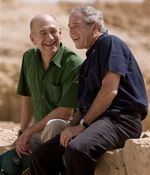
When Ehud Olmert and George W. Bush met at the White House in June, they concluded that Hamas’s violent ousting of Fatah from Gaza – which brought down the Palestinian national unity government brokered by the Saudis in Mecca in March – had presented the world with a new ‘window of opportunity’.[*] (Never has a failed peace process enjoyed so many windows of opportunity.) Hamas’s isolation in Gaza, Olmert and Bush agreed, would allow them to grant generous concessions to the Palestinian president, Mahmoud Abbas, giving him the credibility he needed with the Palestinian people in order to prevail over Hamas. Both Bush and Olmert have spoken endlessly of their commitment to a two-state solution to the Israel-Palestine conflict, but it is their determination to bring down Hamas rather than to build up a Palestinian state that animates their new-found enthusiasm for making Abbas look good. That is why their expectation that Hamas will be defeated is illusory.
more from a 2007 article in the LRB here.
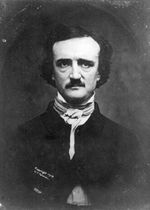
2009 marks the bicentennial of Edgar Allan Poe, arguably the most famed and influential writer in American history. Not only does his work entirely limn the culture, but he also created no fewer than two genres of popular fiction — mystery and modern horror — almost single-handedly. Virtually anyone in the U.S. can recite his poetry (a few lines here and there, at least). His personal life and ambitions inform the clichés of the starving writer in his garret and that of the mad genius. And it’s nigh impossible for someone to graduate from an American high school without having read him. Poe was also a player of hoaxes, a plagiarist, had a substance abuse problem, and couldn’t keep a roof over his head. Poe was a proponent of slavery, the worst sort of would-be social climber, and married a 13-year-old girl in his cousin Virginia Clemm. None of this information is new, of course — these fun facts are probably the answers to a fill-in-the-blank quiz given each year in some sixth-grade classroom in Ohio. The problem is that Poe has been so completely taught that he is very rarely read with the eyes of a reader.
more from The Smart Set here.
From The Guardian:
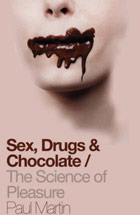 Here's a book perfectly timed for the season of self-flagellation. The cover shows the face of a woman who has been gorging on chocolate, the shameful evidence trickling from her vampiric lips. It's an image calculated to make anyone who has over-indulged of late, in whatever way, commit to a regime of monkish abstinence. Enough of sex, drugs and profiteroles: now's the time for fasting and press-ups. And where better to start than with a sermon on the sins of the flesh?
Here's a book perfectly timed for the season of self-flagellation. The cover shows the face of a woman who has been gorging on chocolate, the shameful evidence trickling from her vampiric lips. It's an image calculated to make anyone who has over-indulged of late, in whatever way, commit to a regime of monkish abstinence. Enough of sex, drugs and profiteroles: now's the time for fasting and press-ups. And where better to start than with a sermon on the sins of the flesh?
Disappointingly, however, Paul Martin doesn't believe that pleasure need be bad for us. In fact, his book ends with a list of recommendations for the wily hedonist – ways to enjoy ourselves without feeling guilty about it. Far from condemning the pursuit of pleasure, Martin shows how unavoidable it is: encoded in our minds and genes. And rather than rail against the licentiousness of contemporary life, he commemorates the sensation-seekers of centuries past, whose excesses make our own seem tame in comparison. Though he doesn't deny the dangers of addiction, his account of drug use down the ages quietly defuses tabloid hysteria. Cannabis? Queen Victoria took it to relieve her period pains. Cocaine? Freud prescribed it to patients and used it himself for relief from migraines. Opium? The users range from Marcus Aurelius to Robert Louis Stevenson. Alcohol? Churchill routinely drank a bottle of champagne a day, whereas Hitler was teetotal – nuff said.
More here.
From The Telegraph:
 It's often said that we now live in a quizzing age – something to do with all the information we're bombarded with and can't use in any other way. Yet for some of us, this isn't a new development. In my own childhood, quizzes figured so prominently that, while other boys dreamed of becoming train drivers, firemen or footballers, I hoped that one day I might get to say “Fingers on the buzzers, please” to people who were not members of my family (and who actually had buzzers).
It's often said that we now live in a quizzing age – something to do with all the information we're bombarded with and can't use in any other way. Yet for some of us, this isn't a new development. In my own childhood, quizzes figured so prominently that, while other boys dreamed of becoming train drivers, firemen or footballers, I hoped that one day I might get to say “Fingers on the buzzers, please” to people who were not members of my family (and who actually had buzzers).
The chance came in 1998 when I was asked to write and present Radio 4's literary quiz show, The Write Stuff. Many of the questions that follow are based on or inspired by the 11 series we've recorded since then – but none requires you to have heard, or heard of, the programme. All you need is some literary knowledge, or even just literary interest.
QUESTIONS
1 Which literary character's first words to whom are: “How are you? You have been in Afghanistan, I perceive?”
2 Who was the first British writer to win the Nobel Prize for Literature – in 1907, if that helps?
3 What's the only book for children by James Bond's creator, Ian Fleming?
4 Who is the only person to have been both shortlisted for the Booker Prize and to have played a girlfriend of Ken Barlow's in Coronation Street?
5 What did Jane Austen's father do for a living?
More here.
Founding contributor and friend of 3QD, Marko Ahtisaari, in Joi Ito's Freesouls:
 “Sometimes one must stop and sit by the roadside, and wait for the soul to catch up.” −African proverb
“Sometimes one must stop and sit by the roadside, and wait for the soul to catch up.” −African proverb
For me, and certainly for many many others, Joi Ito is the model of the intelligent, social traveler. Whenever we think of Joi, we wonder what interesting city he might be in today, what great people he must be sharing a meal with, or whose photographic soul he is freeing at this very moment. But in the end we know we can always follow his digital traces online, and find the answers.
Tokyo today, San Francisco tomorrow, Amsterdam next week. And now playing: the first verse of Airport City by Giant Robot, singing a scene of cosmopolitan jet speed:
“Career is alright thank you for asking
Short notice no time for packing
Shuttle to the terminal traveling light
Last on the plane timing is right”
Right now−seated as I am in business−lounge suburbia in the airport city of Heathrow, waiting for the flight home to finally board (not having quite the right timing à la Giant Robot)−right now seems a fitting time to reflect on the joy of travel, but also to imagine how much better it can get. In many ways, I want to celebrate the world that travel brings to me, as well as how happy I am to be going home.
More here. Also see “Dopplr appoints Marko Ahtisaari as CEO.”
Abbas Milani in the Boston Review:
 What policies should the United States adopt toward Tehran?
What policies should the United States adopt toward Tehran?
Two answers dominate current discussion. The first advocates a grand bargain with the Iranian regime: we provide security guarantees and convince them that “regime change” is no longer part of U.S. policy; in return, the regime abandons its nuclear ambitions. The second proposes to continue the Bush policy: the Islamic Republic gives up its enrichment activities; we respond by opening discussions. The first strategy offers what the regime most covets before starting to talk; the second insists that the regime surrender its most important bargaining chip before negotiations begin.
Neither approach is very promising. Moreover, they share a common weakness. Both concentrate on Iran’s nuclear program and forgo any concern for the fate of human rights and democracy there. That is why many Iranian democrats fear a Libyan scenario, whereby an oppressive regime promises to dismantle its nuclear program in exchange for American and European good will. As a practical matter, “good will” means little more than a disregard for human rights violations in the country graced by it.
To find an alternative strategy, we need to step back from the current impasse and consider a deeper point of convergence between the United States and Iran.
More here.
James Randerson in The Guardian:
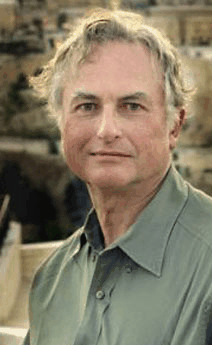 In a late response to Edge.org's annual New Year challenge to the world's leading thinkers, Prof Richard Dawkins has submitted his entry. Edge.org asked scientists, philosophers, artists and journalists “What will change everything?“
In a late response to Edge.org's annual New Year challenge to the world's leading thinkers, Prof Richard Dawkins has submitted his entry. Edge.org asked scientists, philosophers, artists and journalists “What will change everything?“
Dawkins – author of The Selfish Gene and The God Delusion – muses on the effect of breaking down the barrier between humans and animals, perhaps by the creation of a chimera in a lab or a “successful hybridisation between a human and a chimpanzee”.
Here's what he had to say.
Our ethics and our politics assume, largely without question or serious discussion, that the division between human and 'animal' is absolute. 'Pro-life', to take just one example, is a potent political badge, associated with a gamut of ethical issues such as opposition to abortion and euthanasia.
What it really means is pro-human-life. Abortion clinic bombers are not known for their veganism, nor do Roman Catholics show any particular reluctance to have their suffering pets 'put to sleep'. In the minds of many confused people, a single-celled human zygote, which has no nerves and cannot suffer, is infinitely sacred, simply because it is 'human'. No other cells enjoy this exalted status.
More here.
David Segal in Slate:
My big Bollywood break came while I was walking down a side street in Mumbai, talking on a cell phone to a man named Imran.
“How many people with you?” he asked.
“Just me.”
“No problem. You got long hair, short hair?”
“No hair,” I said.
“No problem. You how old?
“Forty-four.”
“No problem. OK, meet tomorrow at the Bandra train station, west ticket counter. Eight a.m., work till 8 p.m. Give you food, makeup, costume, transport. Pay 500 rupees. Put you in Bollywood movie, OK?”
You could call Imran a freelance talent scout for the film industry of India, except—as our interview suggests—he's not looking for talent. He's looking for white people. Bollywood requires a few dozen Western extras every day, to add vérité to crowd scenes in ostensibly exotic locales. Imran's job is to find foreigners and chaperon them to Film City, an expansive badlands of rocks and shrubs at the northern edge of this megalopolis, where most of India's movies are made. I got his phone number through a reporter in Delhi, but usually he finds you, trolling local tourist sites.
More here.
Thursday, January 8, 2009
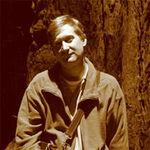 An excellent short story read by our good friend and sometimes 3QD contributor J.M. Tyree… click here to listen.
An excellent short story read by our good friend and sometimes 3QD contributor J.M. Tyree… click here to listen.

Of the many influences on Shakespeare, his Warwickshire origins were most important. As the grandson of a yeoman farmer and the son of a failing Stratford-upon-Avon shopkeeper, he belonged to the country, not the city. He did not accumulate property in London, and may even have felt uncomfortable there. Unlike his theatrical contemporaries, he set scenes in Warwickshire and Gloucestershire. He had a wide and detailed knowledge of country lore and the medicinal uses of plants, using names which baffled the London compositors who set his plays into print. Bate believes that Shakespeare invented “deep England”, a rustic idyll centred on the Midlands that delights in mingling morris men and royal spectacle. In As You Like It the action is set in Arden, not the Ardennes as in Shakespeare’s source, and the Duke and his men play at being “Robin Hood”. In A Midsummer Night’s Dream, the Athenian wood is full of very English fairies and artisans. An idea of “deep England” first appears in Justice Shallow’s scenes in Henry IV Part 2, and is increasingly voiced in the History plays, until in King John Shakespeare asks who will speak for England during a bloody war of succession, when power-hungry leaders cannot agree. “Deep England” is part of the Elizabethan reshaping of national and regional identities. Map-making and “chorography” (the topographical and historical description of a locality) were in vogue.
more from the TLS here.

In 1999, the Croatian novelist Slavenka Drakulić visited The Hague to observe the trials for war crimes committed in the former Yugoslavia. Among the defendants was Goran Jelisić, a thirty-year-old Serb from Bosnia, who struck her as “a man you can trust.” With his “clear, serene face, lively eyes, and big reassuring grin,” he reminded Drakulić of one of her daughter’s friends. Many of the witnesses at The Hague shared this view of the defendant—even many Muslims, who told the court how Jelisić helped an old Muslim neighbor repair her windows after they were shattered by a bomb, or how he helped another Muslim friend escape Bosnia with his family. But the Bosnian Muslims who had known Jelisić seven years earlier, when he was a guard at the Luka prison camp, had different stories to tell. Over a period of eighteen days in 1992, they testified, Jelisić himself killed more than a hundred prisoners. As Drakulić writes, he chose his victims at random, by asking “a man to kneel down and place his head over a metal drainage grating. Then he would execute him with two bullets in the back of the head from his pistol, which was equipped with a silencer.” He liked to introduce himself with the words “Hitler was the first Adolf, I am the second.” He was sentenced to forty years in prison.
more from The New Yorker here.
///
I Shall Forget You Presently, My Dear
Edna St. Vincent Millay
I shall forget you presently, my dear,
So make the most of this, your little day,
Your little month, your little half a year,
Ere I forget, or die, or move away,
And we are done forever; by and by
I shall forget you, as I said, but now,
If you entreat me with your loveliest lie
I will protest you with my favorite vow.
I would indeed that love were longer-lived,
And oaths were not so brittle as they are,
But so it is, and nature has contrived
To stuggle on without a break thus far,—
Whether or not we find what we are seeking
Is idle, biologically speaking.
Rashid Khalidi in The New York Times:
 NEARLY everything you’ve been led to believe about Gaza is wrong. Below are a few essential points that seem to be missing from the conversation, much of which has taken place in the press, about Israel’s attack on the Gaza Strip.
NEARLY everything you’ve been led to believe about Gaza is wrong. Below are a few essential points that seem to be missing from the conversation, much of which has taken place in the press, about Israel’s attack on the Gaza Strip.
THE GAZANS Most of the people living in Gaza are not there by choice. The majority of the 1.5 million people crammed into the roughly 140 square miles of the Gaza Strip belong to families that came from towns and villages outside Gaza like Ashkelon and Beersheba. They were driven to Gaza by the Israeli Army in 1948.
THE OCCUPATION The Gazans have lived under Israeli occupation since the Six-Day War in 1967. Israel is still widely considered to be an occupying power, even though it removed its troops and settlers from the strip in 2005. Israel still controls access to the area, imports and exports, and the movement of people in and out. Israel has control over Gaza’s air space and sea coast, and its forces enter the area at will. As the occupying power, Israel has the responsibility under the Fourth Geneva Convention to see to the welfare of the civilian population of the Gaza Strip.
More here.
The box, the simple box, may be the art form of the 21st century. With or without its sixth wall, it promises a mystery; when its contents (or lack thereof) are displayed, some deeper mystery often remains. Past masters like Joseph Cornell and Marcel Duchamp have inspired new generations of artists to fill rectangular solids with an assortment of found objects. Depending on your taste and perspective, this is either a form of sculpture or a short step up from the elementary-school diorama. The box is thus the darling of both the Tate Modern and the community amateur show: the bricolage celebrates vision rather than craft, suggesting to some that art is effortless, to others that it’s inscrutable. Meaning seems either elusive or all too obvious.
